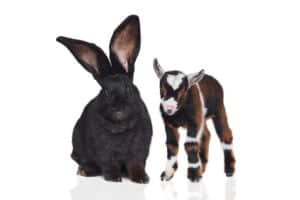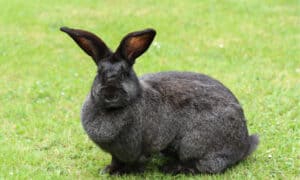Our fuzzy bunny friends have quite an appetite and often love trying new foods. As herbivores, rabbits can safely chow down on various plant-based snacks. The delectable tomato, a fruit sometimes confused for a vegetable, is a staple in many households. But can rabbits enjoy them as well? Yes, rabbits can safely eat tomatoes as long as a few safety rules are followed. Continue reading to find out more about this nutritious snack and how to best add it to your bunny’s diet!
Are Tomatoes Safe for Rabbits?
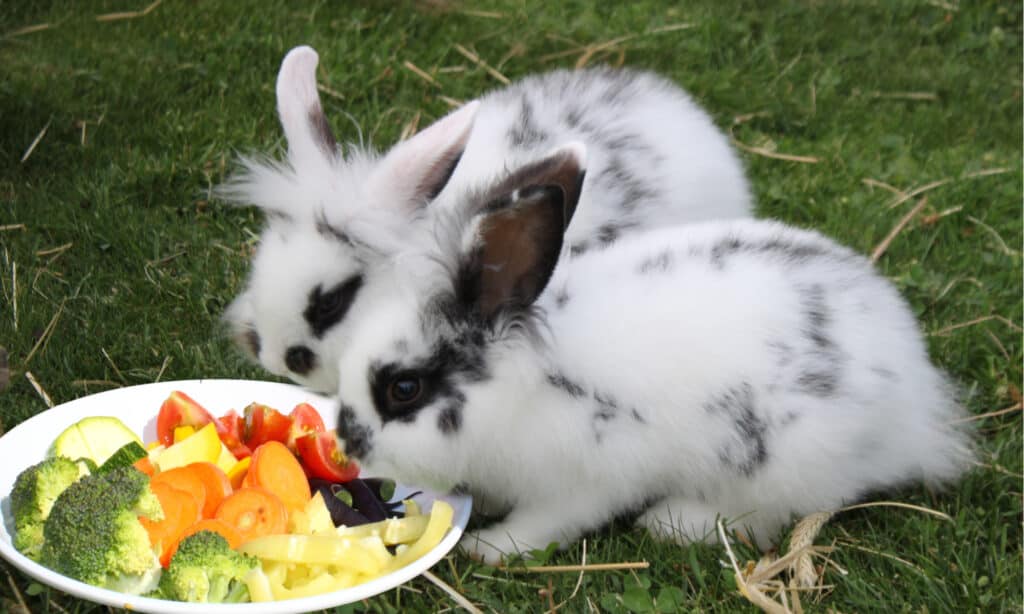
Rabbits enjoy a wide variety of fruits and vegetables, including tomatoes.
©Robirensi/Shutterstock.com
Tomatoes once had a bad reputation for being toxic due to their poisonous vines and leaves. The reason behind this lies in a few toxic substances, known as alkaloids, that are found within most of the tomato plant. However, the flesh of the tomato does not contain dangerous amounts of these chemicals, especially once the fruit has ripened. Therefore, as long as you don’t try feeding plant parts or unripe tomatoes to your rabbits, tomatoes are a healthy and safe treat.
Which Parts of Tomatoes Are Safe for Rabbits?
As mentioned above, the flesh of the tomato is the most recommended part to share with your rabbit. All other plant parts, including the vine, leaves, and stems should be removed entirely before serving. If you’d like to be extra cautious, removing the seeds from any tomatoes you plan to feed your bunny might help as well. This is because tomato seeds may have higher amounts of naturally occurring irritants in them, which can be harmful in large doses.
How Many Tomatoes Can Rabbits Eat?
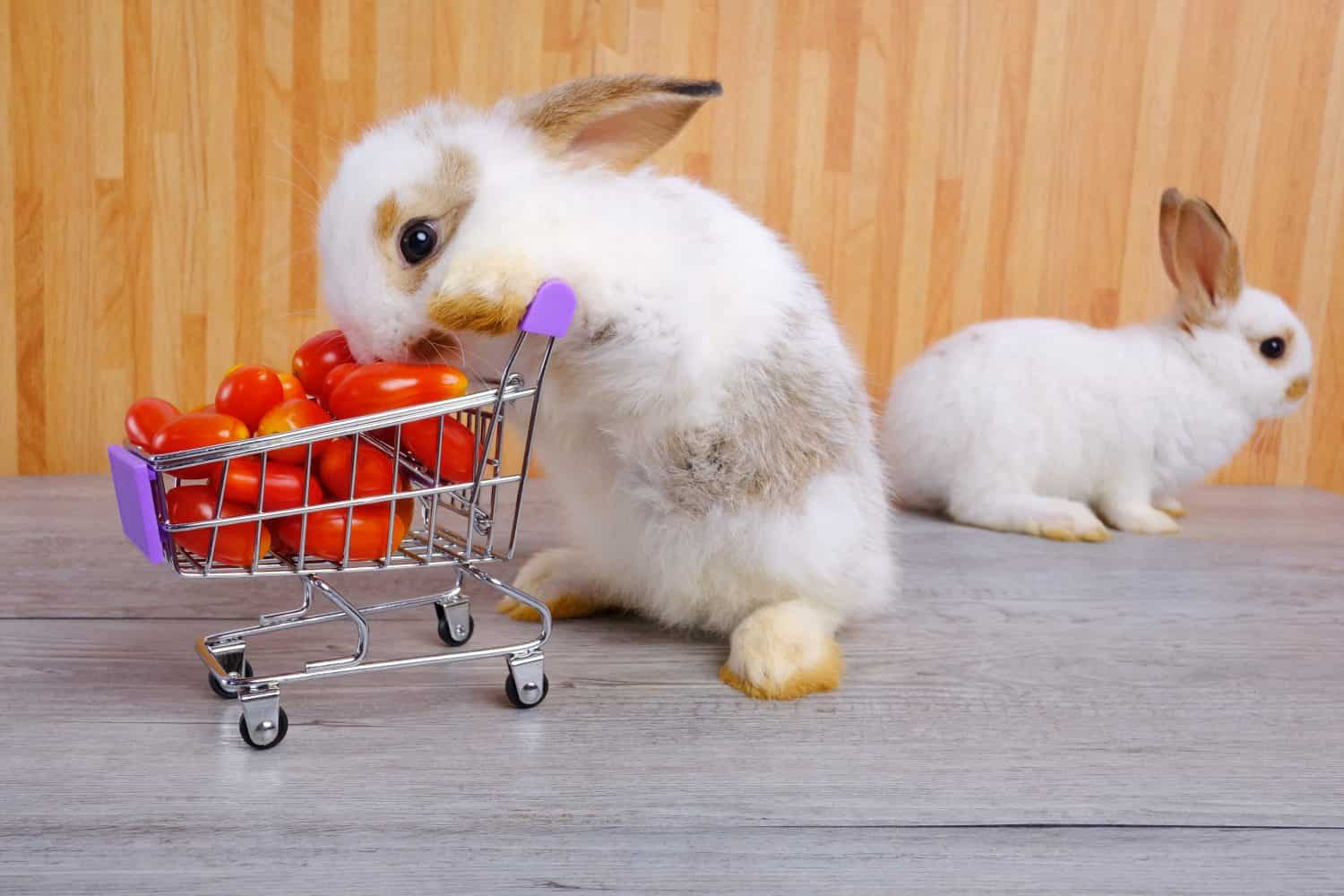
Although they’ll gladly eat a lot of food, rabbits should only get small servings of fruits and veggies.
©katunes pcnok/Shutterstock.com
Bunnies have delicate digestive systems and must rely on a diet containing high fiber and water intake. Occasional delicacies like tomatoes won’t hurt but must be fed in moderation in order to be a healthy addition. That said, no more than a single grape (or cherry) tomato should be given to a rabbit per day. If you’re sharing slices from a larger kind of tomato, keep the portions limited to a similar size.
What Benefits Do Tomatoes Have for Rabbits?
Tomatoes bring plenty of health benefits with them for only a few calories. Amazing amounts of vitamins A and C can be found in these tasty fruits, along with an incredible amount of lycopene. This powerful antioxidant has been thought to aid heart health and reduce the risk of cancer in humans. In rabbits, it’s been found to reduce unhealthy levels of cholesterol.
How Do You Prepare Tomatoes for Rabbits?
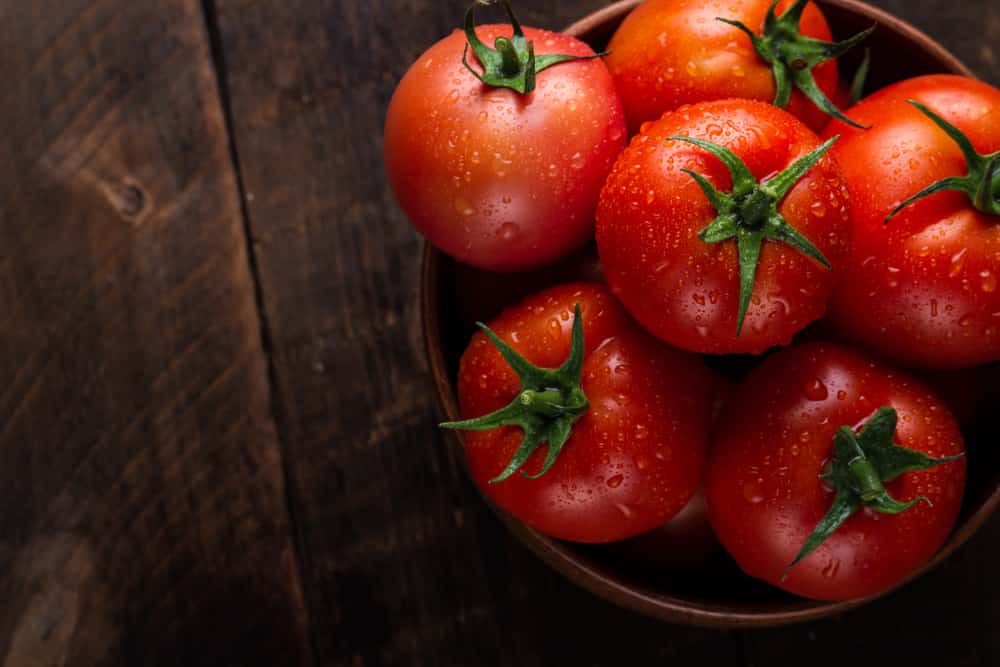
Rabbits enjoy fresh-picked tomatoes just as much as their pet parents do!
©goffkein.pro/Shutterstock.com
Picking out juicy, red tomatoes can be a fun part of any shopping trip. If you’re looking to share some with your rabbit, here are a few tips that will help you get the most out of snack prep time:
- Look for organic tomatoes where available. Doing so will skip out on extra unhealthy chemicals and help avoid GMOs.
- Wash tomatoes thoroughly using cold water. It’s not recommended to use cleaners on tomatoes.
- Remove any stem fragments from the tomatoes.
- Cut tomatoes into small, bite-sized chunks.
- Remove any seeds from inside the tomatoes if you prefer.
- Give tomatoes to your rabbits as an incentive to learn tricks or as a special treat.
- Make sure no more than the size of a grape tomato is fed daily.
What Are Symptoms of Rabbits Eating Too Many Tomatoes?
Overeating anything is unhealthy, and tomatoes are no exception. Due to having high amounts of sugar, sodium, and acid in them, tomatoes may cause stomach upset if bunnies eat too many. If you ever notice any kind of gastric disturbance after feeding your rabbit, it’s best to keep an eye on them. We recommend contacting your veterinarian if symptoms like gas, bloating, or diarrhea appear after snacktime.
Thank you for reading! Have some feedback for us? Contact the AZ Animals editorial team.





